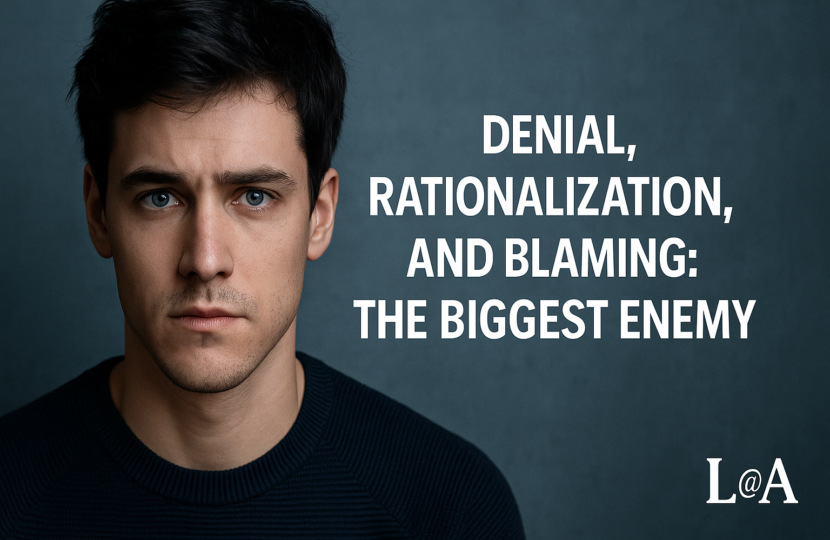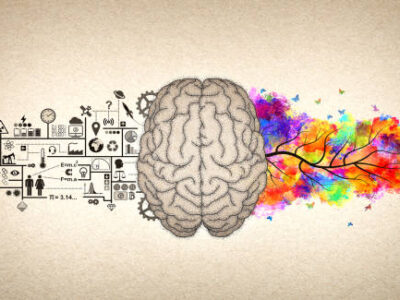Denial, rationalization and blaming are among the most subtle yet powerful enemies to mental wellness and personal evolution. These defense mechanisms create psychological barriers that block healing, prevent honest self-reflection, and delay the change we deeply need. While they may initially offer emotional protection, over time they turn into prisons of the mind. In therapy, the first breakthrough often comes not from solving a problem—but from admitting its presence. At Live Again India, we witness this transformation daily. Clients begin to heal the moment they let go of self-deception and face their truth. In this article, we explore how denial, rationalization and blaming affect your mental health and how acceptance becomes your greatest ally.
Denial: “The Blindness”
Denial is the refusal to accept reality as it is. It blinds you to your own patterns, pain, and truth. When we deny something, we are not escaping the situation—we are escaping ourselves. In the short term, denial numbs the emotional blow. In the long run, it distorts reality and delays healing. People in denial often appear confident, but deep inside they feel confused, anxious, or disconnected. According to the APA, denial is a classic defense mechanism seen in anxiety, trauma, and addiction. Until denial breaks, transformation cannot begin. It is the first wall therapy gently dissolves.
Rationalization: “Unawareness”
Rationalization is when we justify negative behaviors or decisions to avoid guilt, shame, or accountability. It makes wrong look right. For example, someone might say, “I drink to relax—it’s not a problem.” Rationalization creates unawareness by disguising truth under false logic. It keeps individuals stuck in unhealthy cycles while giving them the illusion of control. As noted by NHS UK, individuals struggling with addiction or personality challenges often use rationalization to defend unhealthy patterns. The problem? The more convincing the justification, the further you drift from your truth.
Blaming: “Weakness”
Blaming is when we transfer responsibility to others—be it people, circumstances, or the past. It’s a defense against vulnerability. “My parents made me this way,” “My partner triggered me,” or “It’s society’s fault” are all blame-based statements. Blaming offers a temporary release but prevents empowerment. It externalizes pain, keeping you emotionally stuck. The AAP highlights that blaming is particularly harmful in interpersonal relationships, leading to chronic conflict, victim identity, and low emotional resilience. True strength begins when we take responsibility without collapsing in shame.
How Denial, Rationalization and Blaming Affect Your Life
These three mechanisms form a psychological triangle of resistance. Denial keeps you unaware of what’s wrong. Rationalization convinces you nothing needs to change. Blaming assures you that it’s not your fault anyway. Together, they sabotage insight, growth, and healing. This trio feeds addiction, sustains trauma cycles, and blocks authentic emotional connection. From therapy rooms to family systems, we see how these patterns destroy self-worth and relationships. They are silent enemies—because they make you feel safe, even as they harm you. Overcoming them requires courage, presence, and a clear therapeutic field. And it begins with acceptance.
What Is Acceptance?
Awareness + Admittance + Willingness = ACCEPTANCE Acceptance is not surrender—it is the act of owning your truth without resistance. It’s the doorway to all healing. When you accept something, you are no longer in conflict with reality. It doesn’t mean you approve of it—it means you acknowledge it. Acceptance allows clarity to return, and clarity is the beginning of transformation. As the Rehabilitation Council of India (RCI) emphasizes, acceptance is crucial in all mental health recovery protocols.
- Awareness: This is the first step—seeing what’s actually happening within you. It involves identifying your patterns, thoughts, emotional triggers, and the defense mechanisms in play. Awareness allows observation without judgment. Without awareness, change remains impossible.
- Admittance: Awareness must lead to acknowledgment. Admittance is saying, “Yes, this is me. This is happening.” It breaks the shield of denial and opens the door to vulnerability. In therapy, this is the moment people begin to feel alive again—because the truth starts to breathe.
- Willingness: Once you admit, willingness moves you forward. It is the inner “yes” that allows healing to unfold. Willingness doesn’t mean you know how to change—it means you are open to the journey. It is the most courageous act of all.
How Therapists Can Help You
A therapist offers you more than analysis—they offer presence. In the safe container of therapy, you slowly unmask your defenses. Denial is softened with compassion. Rationalization is met with truth. Blaming dissolves as you reclaim your power. The therapist helps you identify the loop, hold your story gently, and guide you back to yourself. Through evidence-based methods like CBT, psychodynamics, and mindfulness, they provide the tools—but more importantly, they reflect your readiness. They see your truth before you do, and help you walk toward it, one honest step at a time.
Welcome Back to Live Again
At Live Again India, we believe that denial rationalization and blaming can be transformed. You are not broken—you are awakening. We walk with you through confusion, clarity, and choice. Welcome back—to your healing.
Live Again India Mental Wellness is Supporting You – You Are Not Alone.



